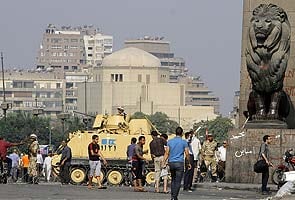
Jerusalem:
Israel has urged Washington not to suspend its annual $1.3 billion in aid to Cairo in the wake of the ouster of Egyptian president Mohamed Morsi by the military, press reports said on Tuesday.
Under US law, all military and economic aid must be suspended to any country where the government is overthrown by the military, although Washington has not yet determined whether it considers the June 30 removal of Morsi was actually a coup - a claim made by the Muslim Brotherhood, to which the ousted president belongs.
According to a senior US official quoted by Haaretz newspaper, Israel's top political echelon had engaged in "marathon phone calls" with Washington over the weekend, warning that any suspension of aid could impact on Israel's security and even undermine its 1979 peace treaty with Egypt.
Israeli Prime Minister Benjamin Netanyahu phoned US Secretary of State John Kerry, Defence Minister Moshe Yaalon spoke with Pentagon chief Chuck Hagel and Israel's National Security Adviser Yaakov Amidror consulted with his US counterpart, Susan Rice, he said.
"The Israelis warned that cutting military aid to Egypt would likely impact negatively on Israel's security, especially given the possibility of further security deterioration in Sinai. They also warned that halting the aid could undermine Israel's peace treaty with Egypt," the paper said.
US aid to Egypt, which began as a direct result of the treaty, has continued uninterrupted since 1979, and Israel fears any chance in US policy could undermine the Egyptian army's commitment to the treaty.
A senior official in Netanyahu's office refused to confirm or deny the report.
The Sinai Peninsula, which borders Israel and the Hamas-run Gaza Strip, has seen a rise in Islamist militancy since the overthrow of former president Hosni Mubarak in February 2011, that has resulted in a rise in attacks on the Jewish state as well as on Egypt's own forces stationed there.
Last week, the Israeli army confirmed it had "authorised" the deployment of Egyptian military reinforcements in the peninsula "in order to contend with security threats in Sinai that pose a threat to both Israel and Egypt." The 1979 treaty imposes strict controls on the numbers of troops permitted to operate there.
Israel's public radio ran a similar report on Israeli efforts to dissuade Washington from halting aid to Cairo. Speaking to the station, an Israeli official said Egypt was likely to go through "a period of chronic instability."
"The Muslim Brotherhood will not easily give up power, we must expect more violence and perhaps more changes in the leadership," he said.
Since Morsi's ouster, Netanyahu has ordered his ministers to stay silent on the unfolding political crisis in Egypt.
Under US law, all military and economic aid must be suspended to any country where the government is overthrown by the military, although Washington has not yet determined whether it considers the June 30 removal of Morsi was actually a coup - a claim made by the Muslim Brotherhood, to which the ousted president belongs.
According to a senior US official quoted by Haaretz newspaper, Israel's top political echelon had engaged in "marathon phone calls" with Washington over the weekend, warning that any suspension of aid could impact on Israel's security and even undermine its 1979 peace treaty with Egypt.
Israeli Prime Minister Benjamin Netanyahu phoned US Secretary of State John Kerry, Defence Minister Moshe Yaalon spoke with Pentagon chief Chuck Hagel and Israel's National Security Adviser Yaakov Amidror consulted with his US counterpart, Susan Rice, he said.
"The Israelis warned that cutting military aid to Egypt would likely impact negatively on Israel's security, especially given the possibility of further security deterioration in Sinai. They also warned that halting the aid could undermine Israel's peace treaty with Egypt," the paper said.
US aid to Egypt, which began as a direct result of the treaty, has continued uninterrupted since 1979, and Israel fears any chance in US policy could undermine the Egyptian army's commitment to the treaty.
A senior official in Netanyahu's office refused to confirm or deny the report.
The Sinai Peninsula, which borders Israel and the Hamas-run Gaza Strip, has seen a rise in Islamist militancy since the overthrow of former president Hosni Mubarak in February 2011, that has resulted in a rise in attacks on the Jewish state as well as on Egypt's own forces stationed there.
Last week, the Israeli army confirmed it had "authorised" the deployment of Egyptian military reinforcements in the peninsula "in order to contend with security threats in Sinai that pose a threat to both Israel and Egypt." The 1979 treaty imposes strict controls on the numbers of troops permitted to operate there.
Israel's public radio ran a similar report on Israeli efforts to dissuade Washington from halting aid to Cairo. Speaking to the station, an Israeli official said Egypt was likely to go through "a period of chronic instability."
"The Muslim Brotherhood will not easily give up power, we must expect more violence and perhaps more changes in the leadership," he said.
Since Morsi's ouster, Netanyahu has ordered his ministers to stay silent on the unfolding political crisis in Egypt.
Track Latest News Live on NDTV.com and get news updates from India and around the world

